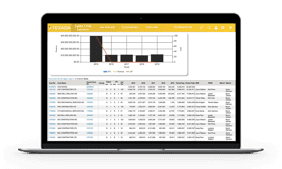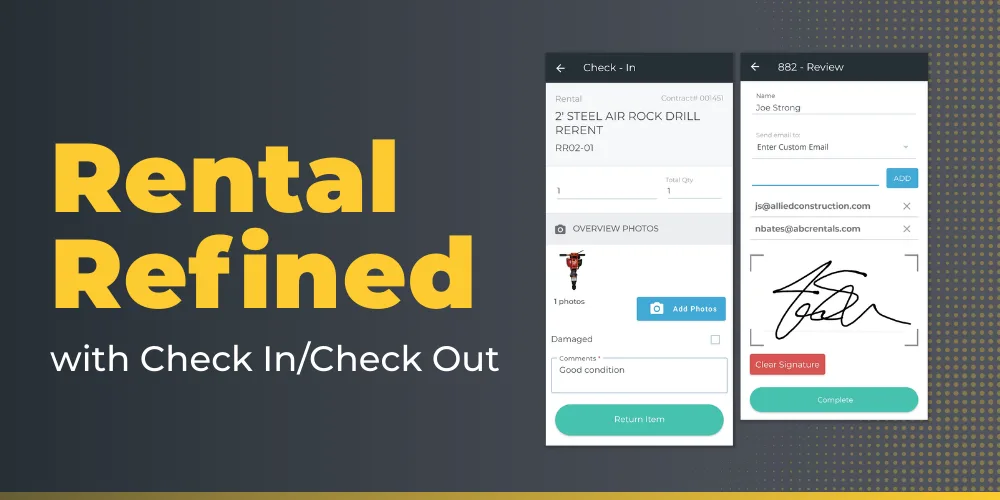As a heavy equipment dealership, you already know the importance of building strong customer relationships. But are you using the right tools to manage those relationships? A customer relationship management (CRM) system can revolutionize how you interact with customers, streamline your processes, and increase sales.
Customer Relationship Management (CRM) systems have become essential tools in today’s business world, acting as the linchpin for growth and customer service excellence. A robust CRM defines the core of customer interactions for equipment dealers and is instrumental in streamlining operations, honing sales strategies, and staying ahead of the competitive curve.
In this blog post, we will delve into the transformative power of CRM for equipment dealers, illustrating how it simplifies complex processes and aligns your business for success. Join us as we explore integrated CRM systems to enhance your dealership efficiency, bolster customer satisfaction, and drive your business growth to new heights.
The Importance of CRM in the Equipment Dealership Industry
Here are some of the key benefits of implementing a CRM system in your dealership:
Centralizing Your Customer Data
A CRM system allows you to store and access customer data in one place. It includes contact information, purchase history, and communication records. Having all this information in one place allows you to easily access and use it to personalize your interactions with each customer. It can help build stronger relationships, increase loyalty, and increase repeat business.
Getting a 360-degree view
With a robust CRM solution, you can get a holistic view of the entire customer and deal journey, helping you manage it more effectively. By tracking each stage of the sales process, you can identify areas where deals are getting stuck and take action to move them forward. You can also use the data from your CRM system to analyze trends in your sales process and make adjustments to improve performance.
Streamlining Your Workflow
A CRM system can also help you reduce manual data entry and automate routine tasks. By automating tasks like data entry, follow-up emails, and appointment scheduling, you can free up your sales team to focus on selling. It can increase productivity, simpler dealership quoting, healthier cash flow, and faster customer response times.
Measuring Your Marketing
Finally, a CRM system can help you track your marketing efforts and measure their effectiveness. By tracking customer engagement with your marketing campaigns, you can identify which tactics are working and which need to be adjusted. It can help you optimize your marketing budget and drive more qualified leads to your dealership.
Overall, implementing a CRM system can bring many benefits to equipment dealerships. From centralizing customer data to streamlining workflows and measuring marketing effectiveness, a CRM system can help you build stronger customer relationships, increase sales, and improve overall performance. If you’re not already using a CRM system, now is the time to explore your options.
Pro Tip: Regularly update and maintain your CRM system to ensure data accuracy and relevance. This practice maximizes the system’s effectiveness in centralizing customer data, providing a comprehensive view of customer interactions, and optimizing workflows, ultimately leading to enhanced customer relationships and increased sales.
Key Features of a CRM System for Equipment Dealers
| Key Features | Description | Details |
| Lead and ContactManagement for Tailored Client Interactions | Efficiently managing leads and contacts is the cornerstone of any robust CRM system. |
|
| Sales Automation to Increase Efficiency and Reduce Manual Errors | Automating routine tasks is essential for modern equipment dealerships. |
|
| Inventory Management Features that Synchronize with
Equipment Stock |
An integrated inventory management system within the CRM allows dealers to: |
|
Streamlining Equipment Inventory Management through CRM Integration
| Aspect | Description | Benefits |
| Linking Sales Data with Inventory Levels for Real-Time Accuracy | Integrating CRM software ties sales data directly with current inventory levels. The inventory count is automatically updated when a piece of equipment is sold. |
|
| Automated Alerts for Inventory Replenishment and Order Fulfillment | CRM systems can set up automated alerts to notify when stock levels are low, or items are ready for order fulfillment. |
|
| Tracking Equipment Lifecycle and Service Requirements | CRM integration helps manage the equipment lifecycle by tracking service history and lifecycle stages. |
|
| Overall Benefits | Integrating CRM software into inventory management operations. |
|
This table organizes the aspects of streamlining equipment inventory management through CRM integration, detailing each aspect’s description and specific benefits.
Enhancing Customer Service and Support for Equipment Sales and Rentals
A unified view of customer interactions is crucial for effective customer service in equipment sales and rentals. With CRM systems, dealers can track all customer interactions from initial contact through final sales. It ensures every team member can access up-to-date customer information, leading to more personalized and efficient service.
Streamlining the service request process and parts ordering can significantly improve response times and customer satisfaction. CRM solutions offer workflows that can automate service requests, assign tasks to appropriate team members, and facilitate quick ordering of necessary parts. This streamlined process reduces customer downtime and helps dealers manage their internal resources more effectively.
Lastly, leveraging CRM for proactive and preventive customer service models helps equipment dealers anticipate customer needs. By analyzing data and past interactions, dealers can offer maintenance and service before issues arise, potentially reducing equipment downtime and building customer trust and loyalty.
- Enhanced service ticket management for faster resolution.
- Automated reminders for preventive maintenance and service schedules.
- Easy tracking of warranty information and service histories.
By embracing these advanced CRM capabilities, equipment dealers can react to and prevent customer issues, reinforcing their commitment to exceptional customer service and support.
Pro Tip: Implement a system for capturing customer feedback and insights within your CRM to improve service quality and proactively address emerging needs or concerns. This will ensure your dealership stays responsive to customer expectations, fostering long-term loyalty and satisfaction.
Mobile CRM Solutions for On-The-Go Access by Sales Teams
Equipment dealers are increasingly recognizing the importance of mobility in their sales processes. Mobile CRM solutions are not just a convenience but essential tools enabling sales teams to work more effectively from anywhere. Let’s explore how a mobile CRM platform can transform field sales staff operations.
Key Advantages of a Mobile CRM Platform for Sales Team
- Enhanced Productivity: Sales teams can update deals, schedule appointments, and follow up with leads from their mobile devices.
- Improved Customer Interactions: With instant access to customer history and preferences, reps can conduct more personalized and informed conversations.
- Seamless Collaboration: Real-time data synchronization allows for better collaboration and coordination, even when members are geographically dispersed.
Real-time Access to Customer Data, Inventory, and Sales Tools
With mobile CRM, the most up-to-date information is at your sales team’s fingertips. It empowers them to:
- Check inventory levels and product details on-site, ensuring they can answer customer queries promptly.
- Access sales performance dashboards to make data-driven decisions quickly.
- Utilize sales tools like configurators and estimators to provide immediate quotes to prospects.
Integrating CRM with Other Business Systems
Equipment dealers are continually striving for greater efficiency and streamlined operations. Integrating a Customer Relationship Management (CRM) system with other business management platforms, such as Enterprise Resource Planning (ERP) and accounting software, is a potent strategy for achieving these objectives. Let’s delve into the tangible benefits this integration brings to your dealership’s productivity and the key considerations to ensure a smooth merger of technologies.
The Benefits of CRM Integration with Other Business Management Systems
- Centralized Data: An integrated CRM system centralizes customer information across all departments, ensuring every team member is informed and empowered to act.
- Enhanced Visibility: With integrated systems, you gain enhanced visibility into all aspects of the business cycle, from inventory and sales to customer service and financials.
- Improved Efficiency: Automated data flows between systems reduce manual entry errors and save valuable time, allowing staff to focus on more strategic tasks.
- Better Customer Experience: A holistic view of the customer journey enables personalized engagement and swift response to inquiries and issues.
- Accurate Reporting: Real-time data sync ensures accuracy in reports and analytics, leading to better strategic decisions.
How Seamless Data Flow Can Optimize Operational Efficiency
Efficiency is a direct product of how well the various parts of the dealership machinery work together. A seamless data flow between CRM and other systems ensures that:
- Data Redundancy is Eliminated: Duplication of information across systems is reduced, thus streamlining data management processes.
- Operational Silos are Broken Down: With a holistic approach, teams can collaborate more effectively, breaking down barriers that typically exist between different departments.
- Customer Insights are Leveraged: Sales, service, and marketing can utilize CRM-derived insights to fine-tune strategies and foster customer-centric tactics.
Considerations When Integrating CRM with Enterprise Resource Planning (ERP) Tools
Successfully integrating CRM with ERP tools involves strategic planning. Here are some considerations to ensure a successful integration:
- Compatibility: Ensure the software systems are compatible or consider solutions designed to work together.
- Customization Needs: Evaluate how much customization is necessary to meet your unique dealership needs.
- User Training: Invest in comprehensive training for your employees to maximize the benefits of the new integrated system.
- Data Security: Implement robust security protocols to protect sensitive customer and business data.
- Scalability: Choose systems that can grow with your dealership, accommodating future expansions and customer base growth.
Connecting your CRM with other business systems is not just a strategic move for increased productivity; it’s an essential step in future-proofing your equipment dealership in today’s highly competitive market. By ensuring that each consideration is met with thorough planning and responsible execution, you lay down the foundation for a resilient, customer-centric operation that thrives on efficiency and result-driven data insights.
Best Practices in CRM Implementation for Equipment Dealers
Implementing a Customer Relationship Management (CRM) system can be a transformative strategy for equipment dealers. However, to fully harness CRM’s power, it’s crucial to establish best practices during the implementation process. Equipment distributors can ensure their CRM investment delivers the expected benefits and drives business growth by doing so.
Steps to Successful CRM Adoption and Staff Training
- Clearly Define Goals: Set objectives for what you want to achieve with the CRM, such as improved customer service or streamlined sales processes.
- Select a Project Team: Designate a team that understands the technology and the equipment dealership business to lead the CRM implementation.
- Engage Users Early: Involve end-users in the selection and configuration processes to ensure the system meets their needs and to gain their buy-in.
- Iterative Training: Offer continuous training in multiple formats (in-person, online, guides) to accommodate different learning preferences and address the CRM system’s evolving features.
- Monitor and Adjust: Review staff use of the CRM regularly and adjust processes or training as necessary.
Customizing the CRM to the Unique Needs of Equipment Dealerships
- Industry-Specific Configuration: Tailor the CRM to handle the specific types of transactions, inventory, and customer interactions common in the equipment dealership industry. Or, even better, select a CRM that is designed specifically for equipment dealers!
- Workflow Automation: Implement automation for routine tasks to free up staff time for high-value activities.
- Integration with Other Systems: Ensure the CRM works seamlessly with existing ERP, accounting, and inventory systems for a unified view of business operations.
Maintaining Data Hygiene and System Updates for a Robust CRM Environment
Maintaining the integrity of CRM data is essential for obtaining accurate insights and providing high-quality customer service. Equipment dealers should:
- Establish Data Entry Standards: Provide clear guidelines for data entry to ensure consistency and accuracy.
- Perform Regular Cleanups: Schedule routine data cleanups to remove duplicates and correct errors.
- Keep Software Up to Date: Regularly apply system updates and patches to benefit from enhanced features and improved security.
- Review and Revise: Continuously monitor the CRM’s performance and be prepared to make changes to adapt to new business challenges or market demands.
Key Takeaways
- A CRM system consolidates all customer information, providing a 360-degree view that enhances personalized interactions and strengthens customer relationships.
- Automating routine tasks such as data entry, follow-up emails, and appointment scheduling through CRM increases productivity and reduces manual errors, allowing sales teams to focus on selling.
- Integrating CRM with inventory management ensures real-time accuracy, prevents overselling, optimizes stock levels, and improves order fulfillment efficiency.
- CRM systems enable proactive and personalized customer service by providing instant access to service histories and customer preferences, leading to higher customer satisfaction and loyalty.
Unlocking the Potential of CRM in Equipment Dealership
In an increasingly competitive landscape, CRM (Customer Relationship Management) stands out as a beacon of innovation and efficiency for equipment dealers. As we have explored, a CRM system is not just a tool; it’s a game changer for those in the equipment dealership industry. It transforms the very fabric of business management by streamlining sales, enhancing inventory management, and unlocking new heights in customer satisfaction and service.
However, finding a CRM can be challenging for equipment dealers. Many standard CRM solutions are simply not equipped with the tools dealers need. However, Texada SalesLink is a purpose-built dealer CRM, empowering dealerships to convert opportunities into revenue with a complete view, including leads, quotes, sales records, fleet information, territory details, and more.
Connect with us to learn more about Texada SalesLink or the rest of Texada’s Equipment Business Management suite of products.
you already know the importance of building strong relationships with your customers. But are you using the right tools to manage those relationships? A customer relationship management (CRM) system can revolutionize the way you interact with customers, streamline your processes, and increase sales. Here are some of the key benefits of implementing a CRM system in your dealership:
1. Centralizing Your Customer Data
A CRM system allows you to store and access all your customer data in one place. This includes contact information, purchase history, and communication records. By having all of this information in one place, you can easily access it and use it to personalize your interactions with each customer. This can help build stronger relationships, leading to increased loyalty and repeat business.
2. Getting a 360-degree view
With a robust CRM solution, you can get a holistic view of the entire customer and deal journey, helping you manage it more effectively. By tracking each stage of the sales process, you can identify areas where deals are getting stuck and take action to move them forward. You can also use the data from your CRM system to analyze trends in your sales process and make adjustments to improve performance.
3. Streamlining Your Workflow
A CRM system can also help you reduce manual data entry and automate routine tasks. By automating tasks like data entry, follow-up emails, and appointment scheduling, you can free up your sales team to focus on selling. This can lead to increased productivity, simpler dealership quoting, healthier cashflow, and faster response times for customers.
4. Measuring Your Marketing
Finally, a CRM system can help you track your marketing efforts and measure their effectiveness. By tracking customer engagement with your marketing campaigns, you can identify which tactics are working and which need to be adjusted. This can help you optimize your marketing budget and drive more qualified leads to your dealership.
Overall, implementing a CRM system can bring many benefits to equipment dealerships. From centralizing customer data to streamlining workflows and measuring marketing effectiveness, a CRM system can help you build stronger relationships with customers, increase sales, and improve overall performance. If you’re not already using a CRM system, now is the time to start exploring your options.
However, finding a CRM can be challenging for equipment dealers. Many standard CRM solutions are simply not equipped with the tools dealers need. However, Texada SalesLink is a purpose-built dealer CRM, empowering dealerships to convert opportunities into revenue with a complete view, including leads, quotes, sales records, fleet information, territory details, and more.
Connect with us to learn more about Texada SalesLink or the rest of Texada’s Equipment Business Management suite of products.






